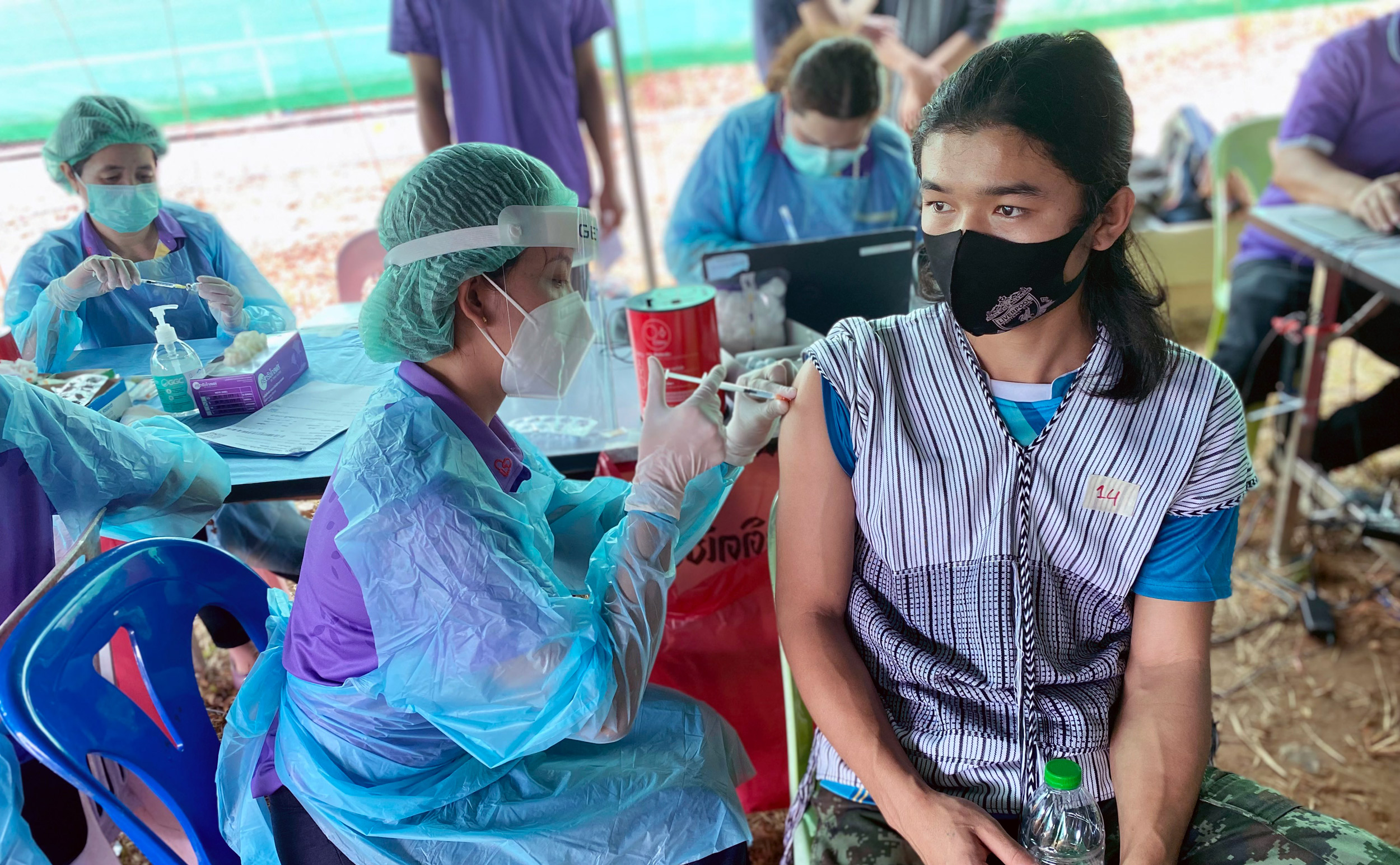Dispelling anxieties, medics and refugee volunteers join forces to vaccinate refugees in Thailand

Dispelling anxieties, medics and refugee volunteers join forces to vaccinate refugees in Thailand
Just as it takes a village to raise a child, it takes a whole community to fight a pandemic.
In the refugee camps along the Thai-Myanmar border, the roll-out of COVID-19 vaccinations are underway, with nurses, doctors and refugee volunteers mobilized to guide refugees through the vaccination process and counsel the hesitant.
Vaccinations of refugees in Thailand have been proceeding apace, thanks to the combined efforts of the Thai public health authorities and key partners including the Thai Red Cross, the Royal Chulaborn Academy, International Rescue Committee and Malteser International. Thailand hosts over 90,000 refugees along the border, in addition to over 4,500 refugees and 700 asylum-seekers living in urban areas.
On 22 November, the Thai Red Cross administered a second dose of vaccine to over a thousand refugees who had received their first dose in late October in Tham Hin refugee camp.
“I hope that the vaccinations will allow residents to resume life”
Hsar Blu was glad to be vaccinated during this campaign. A resident of Tham Hin camp in Ratchaburi province, she had found the COVID-19 restrictions challenging.
“The camp was under lockdown, everyone needed to stay home, we could not go anywhere,” she explains.
Though basic services continued to be provided, the intermittent lockdowns over the past two years meant that most humanitarian organizations were periodically unable to access the nine camps for Myanmar refugees along the border.
“I hope that the vaccinations will allow residents to resume life and put an end to the lockdowns, which have lowered our quality of life,” Hsar Blu adds. “The vaccine means that I can soon move around freely, visit friends, and that my children can go back to school, which will hopefully re-open soon.”
The refugees receiving their vaccinations have chosen to do so; they are not mandatory. UNHCR and partners provide tailored counselling to address any concerns and questions that people might have. Beyond providing medical explanations, nurses and doctors also reassure refugees who are anxious about receiving a vaccine.
Saya Piyapit, a nurse with IRC, noticed how worried Lar Er was when registering for vaccination. Saya took the time to sit down with Lar Er to address her fears.
“I shared my own COVID vaccination story with Lar Er. I’ve received three doses of vaccines – I didn’t have any side effects after the first two doses, though I developed a bit of a fever after the third one,” she says. “Camp residents are sometimes less informed, which is why they can be more hesitant. I try to explain the benefit of vaccination. I emphasize that even though you can still get COVID-19 when vaccinated, symptoms will be lessened and the risk of complications reduced.”
“Our job is to build trust with our patients.”
Saradit Sisavat, a doctor with the Thai Red Cross, has seen distorted information at work. Earlier this year, he participated in a vaccination campaign in which a person died from a stroke shortly after receiving a vaccine. Although the death was coincidental, rumours started spreading about the vaccine’s role in the death.
“Our job is to build trust with our patients. I always stress to my patient that they should meet with their doctor if they are experiencing any serious side effects. The current situation is dangerous, so a person who has received the vaccine is at least safe. If one compares the disadvantages to the advantages of the vaccine, there are certainly fewer disadvantages.”
The camp management was proactive in supporting the vaccination programme. Tham Hin Camp Commander, Saw Show Lay, raised awareness among residents by conducting home visits with his team to promote vaccination.
UNHCR and its partners have also continued to sharing COVID-19 prevention, response and vaccination messages in Karen, Karenni and Myanmar languages with refugees, including those with specific needs. In all camps, community engagement workers have shared information via small group dialogues, posters, leaflets, PA system announcements and videos. The Border Consortium (TBC) collaborated with the Karen Information Center to produce and screen videos to amplify messaging about vaccination among refugee communities.
Smile Lay, a refugee volunteer, is hopeful that life can resume once more camp residents are vaccinated.
“I wish that we can meet as a community again, that children can gather for sport,” she says. “I cannot wait to go back to church – I was in the choir. I cannot wait to sing again.”
For now, Smile is contributing to the efforts to keep her community safe from coronavirus. She is tasked with holding the clock to help monitor the 15-minute observation period for newly vaccinated refugees, so that medical staff can be on hand for any rare allergic reactions to the vaccines.
As of early December 2021, Thailand has vaccinated 59% of the country’s population. In addition to the ongoing vaccination roll-out in the camps, UNHCR welcomes Thailand’s efforts to enable all those living in the country, including refugees and asylum-seekers in urban areas, to be vaccinated against COVID-19.









